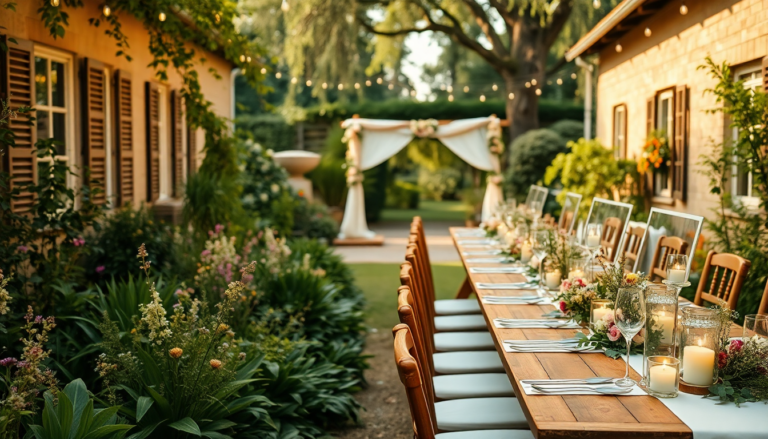Argomenti trattati
In recent years, backyard weddings have truly taken off. As couples look for more personal and intimate settings for their special day, the backyard has become a top choice, embodying both sentimentality and warmth. But while the idea of hosting a wedding in a familiar space sounds delightful, it also comes with its own set of challenges. Navigating these complexities requires careful planning and a keen understanding of both the logistical and emotional aspects involved.
Understanding the trend: Why backyard weddings are in vogue
So, what’s driving this trend? The rise of backyard weddings reflects a broader cultural shift in how people approach significant life events. Today, couples are moving away from traditional, grand venues, opting instead for settings that resonate with their personal stories. Event planner Jove Meyer puts it perfectly: “There’s just something undeniably special about saying ‘I do’ in your own backyard.” This sentiment strikes a chord with many couples who desire a deeply emotional atmosphere for their celebration.
Moreover, the desire for authenticity and connection has never been more pronounced. Much like how our homes have evolved from mere showcases to reflections of our personalities, weddings are also shifting toward a more personal touch. Couples want their special day to feel warm, inviting, and uniquely theirs.
However, it’s essential to recognize that the glamorous portrayal of backyard weddings on social media often glosses over the behind-the-scenes realities. Planning a wedding at home can be just as, if not more, costly and labor-intensive than renting a venue. As Meyer points out, “The reality is, you’re building a venue from the ground up.” This means considering rentals for tables, chairs, restrooms, and more—factors that can significantly inflate the budget.
Logistical considerations: Planning for success
While the emotional appeal of a backyard wedding is compelling, the logistics are equally critical. If you’re used to hosting intimate gatherings, a wedding brings a much greater level of planning. Luxury event planner Victoria Dubin emphasizes the importance of having a skilled wedding planner, especially when using a home as the venue. “You need people who have experience in tenting and building out all the ancillary spaces,” she asserts.
Understanding local regulations and obtaining necessary permits is paramount. Couples often underestimate the complexity of managing logistics like power supply, guest flow, and cleanup. A seasoned planner can streamline these processes, allowing couples to focus on enjoying their day rather than getting bogged down in the details.
Moreover, the landscape itself can pose challenges. Enhancements such as landscaping, outdoor lighting, and even temporary installations like tents require foresight and preparation. As Rebecca Gardner suggests, taking steps to beautify the yard well in advance can make a significant difference. “Consider enhancing the landscape a season in advance, trimming a week before,” she advises, ensuring that the space is both visually appealing and functional.
Weather contingencies and space planning
One of the most daunting aspects of hosting a backyard wedding is the unpredictable nature of weather. Couples must prepare for various contingencies, especially for outdoor events. Tents are a must-have for protection against rain, sun, or wind, but they come with their own logistical considerations. Meyer points out that not all backyards can be easily tented, so assessing the terrain and ensuring that the ground is level is crucial.
Planning for the unexpected extends beyond just rainy days. Couples should have multiple backup plans in place for scenarios like sudden temperature shifts or adverse weather conditions. Dubin emphasizes that the day-of weather can be unpredictable, making it essential to have a clear strategy for keeping guests comfortable.
Additionally, the space must be adequately prepared for various activities throughout the day. From the ceremony to the reception and everything in between, thoughtful planning of physical spaces is key. Identifying locations for the ceremony, cocktail hour, and reception is crucial to avoid logistical chaos during the event.
Maintaining your yard post-wedding
After the festivities wind down, couples need to consider the potential impact on their outdoor space. Hosting a large event in a backyard can lead to some wear and tear. Meyer candidly notes that “grass under tents will suffer,” and it’s vital to budget for repairs like sodding and lawn restoration. Being prepared for the aftermath is just as important as the lead-up to the big day.
In conclusion, while backyard weddings can offer a unique and intimate experience, they also come with challenges that require careful consideration and planning. By understanding the emotional significance, logistical necessities, and potential post-event implications, couples can create a memorable celebration that reflects their love story while minimizing stress. Are you ready to take on the adventure of a backyard wedding?

